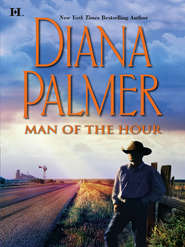По всем вопросам обращайтесь на: info@litportal.ru
(©) 2003-2024.
✖
A Texas Christmas: True Blue / A Lawman's Christmas: A McKettricks of Texas Novel
Автор
Год написания книги
2019
Настройки чтения
Размер шрифта
Высота строк
Поля
“I don’t want to marry Gwen Cassaway,” he said at once. “I just thought I’d mention that, because I can read minds, and I don’t like what you’re thinking.”
“She’s a nice girl.”
“She’s a woman.”
“She’s a nice girl. She has a very idealistic and romantic attitude for someone who lives in the city. And I ought to know. I have women from cities coming through here all the time, talking about unspeakable things right in public with the whole world listening.” Her lips made a thin line. “Do you know, Grange was having lunch next to a table of them where they were discussing men’s, well, intimate men parts,” she amended, clearing her throat, “and Grange got up from his chair, told them what he thought of them for discussing a bedroom topic in public in front of decent people and he walked out.”
“What did they do?”
“One of them laughed. One of the others cried. Another said he needed to start living in the real world instead of small town ‘stupidville.’” She grinned. “Of course, she said it after he’d already left. While he was talking, they didn’t say a word. But they left soon after. I was glad. I can’t choose my clientele and I’ve only ever ordered one person to leave my restaurant since I’ve owned it,” she added.
She dragged herself back to the present. “But the topic of conversation was getting to me, too. People need to talk about intimate things in private, not in a public place with their voices raised. We don’t all think alike.”
“Only in some ways,” he pointed out, and hugged her impulsively. “You’re a nice mother. I’m so lucky to have you for an adoptive parent.”
She hugged him back. “You’ve enriched my life, my sweet.” She sighed, closing her eyes in his warm embrace. “When I lost Bart, I wanted to die, too. And then your mother and stepfather died, and there you were, as alone as I was. We needed each other.”
“We did.” He moved away and smiled affectionately. “You took on a big burden with me. I was a bad boy.”
She groaned and rolled her eyes. “Were you ever! Always in fights, in school and out. I spent half my life in the principal’s office and once at a school board meeting where they were going to vote to throw you right out of school altogether and put you in alternative school.” Her face hardened. “In their dreams!”
“Yes, you took a lawyer to the meeting and buffaloed them. First time it ever happened, I heard later.”
“I was very mad.”
“I felt really bad about that,” he said. “But I put my nose to the grindstone after, and tried hard to make it up to you.”
“Joined the police force, went to night school and got your associate degree, went to the San Antonio Police Department and worked your way up in the ranks to sergeant,” she agreed, smiling. “Made me so proud!”
He hugged her again. “I owe it all to you.”
“No. You owe it to your hard work. I may have helped, but you pulled yourself up.”
He kissed her forehead. “Thank you. For everything.”
“You’re my son. I love you very much.”
He cleared his throat. Emotions were difficult for him, especially considering his job. “Yeah. Me, too.”
She grinned. The smile faded as she searched his large, dark eyes. “Do you ever wonder about your mother’s past?”
His eyebrows shot up. “What a question!” He frowned. “What do you mean?”
“Do you know anything about her friends? About any male friends she had before she married your stepfather?”
He shrugged. “Not really. She didn’t talk about her relationships. Well, I wasn’t old enough for her to confide in me, either, you know. She never was one to talk about intimate things,” he said quietly. “Not even about my real father. She said that he died, but she never talked about him. She was very young when I was born. She did say she’d done things she wanted forgiveness for, and she went to confession a lot.” He studied her closely. “You must have had some reason for asking me that.”
She put her lips tightly together. “Something I overheard. I wasn’t supposed to be listening.”
“Come on, tell me,” he said when she hesitated.
“Cash Grier was having lunch with some fed. They were discussing Machado. The fed mentioned a woman named Dolores Ortíz who had some connection to General Machado when he lived in Mexico.”
Chapter Two
“Dolores Ortíz?” he asked, the paring knife poised in midair. “That was my mother’s maiden name.”
“I know.”
Rick frowned. “You mean my mother might have been romantically involved with Emilio Machado?”
“I got that impression,” Barbara said, nodding. “But I wasn’t close enough to hear the entire conversation. I just got bits and pieces of it.”
He pursed his lips. “Well, my father died around the time I was born, so it’s not impossible that she did meet Machado in Mexico. Although, it’s a big country.”
“You lived in the state of Sonora,” she pointed out. “That’s where Machado had his truck farm, they said.”
He finished skinning the tomato and reached for another one. “Wouldn’t that be a coincidence, if my mother actually knew him?”
“Yes, it would.”
“Well, it was a long time ago,” he said easily. “And she’s dead, and I never knew him. So what good would it do for them to dig up an old romance now?”
“I have no idea. It bothered me, a little. I mean, you’re my son.”
“Yes, I am.” He glanced at her. “I love it when people get all flustered and start babbling when you introduce me. You’re blonde and fair and I’m dark and obviously Hispanic.”
“You’re gorgeous, my baby,” she teased. “I just wish women would stop crying on your shoulder about other men and start trying to marry you.”
He sighed. “Chance would be a fine thing. I carry a gun!” he said with mock horror.
She glowered at him. “All off-duty policemen carry guns.”
“Yes, but I might shoot somebody accidentally, and it would get in the way if I tried to hug somebody.”
“I gather that somebody female mentioned that?”
He sighed and nodded. “A public defender,” he said. “She thought I was cute, but she doesn’t date men who carry. It’s a principle, she said. She hates guns.”
“I hate guns, too, but I keep a shotgun in the closet in case I ever need to defend myself,” Barbara pointed out.
“I’ll defend you.”
“You work in San Antonio,” she said. “If you’re not here, I have to defend myself. By the time Hayes Carson could get to my place, I’d be … well, not in any good condition if somebody tried to harm me.”
That had happened once, Rick recalled with anger. A man he’d arrested, after he’d been released, had gone after Rick’s adoptive mother for revenge. It was just chance that Hayes Carson had stopped by when he was off duty, in his unmarked truck, to ask her about catering an event. The ex-convict had piled out of his car and come right up on the porch with a drawn gun—in violation of parole—and banged on the door demanding that Barbara come outside. Hayes had come outside, disarmed him, cuffed him and taken him right to jail. The man was now serving another term in prison, for assault on a police officer, trespassing, attempted assault, possessing a firearm in violation of parole and resisting arrest. Barbara had testified at his trial. So had Hayes.
Rick shook his head. “I hate having you in danger because of my job.”











